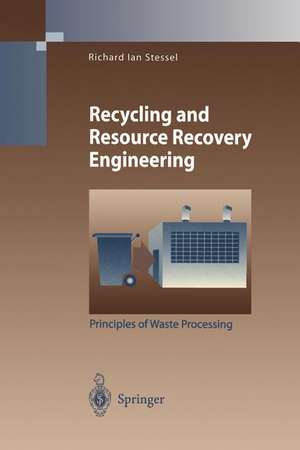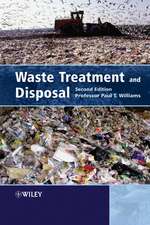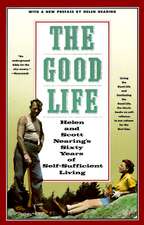Recycling and Resource Recovery Engineering: Principles of Waste Processing: Environmental Science and Engineering
Autor Richard I. Stesselen Limba Engleză Paperback – 30 dec 2011
Din seria Environmental Science and Engineering
- 18%
 Preț: 1238.42 lei
Preț: 1238.42 lei - 18%
 Preț: 2166.68 lei
Preț: 2166.68 lei - 18%
 Preț: 1420.88 lei
Preț: 1420.88 lei - 18%
 Preț: 914.20 lei
Preț: 914.20 lei - 18%
 Preț: 1225.94 lei
Preț: 1225.94 lei - 18%
 Preț: 1118.13 lei
Preț: 1118.13 lei - 18%
 Preț: 1402.74 lei
Preț: 1402.74 lei - 18%
 Preț: 3419.93 lei
Preț: 3419.93 lei - 18%
 Preț: 1223.55 lei
Preț: 1223.55 lei - 18%
 Preț: 1008.91 lei
Preț: 1008.91 lei - 18%
 Preț: 1234.46 lei
Preț: 1234.46 lei - 18%
 Preț: 1409.82 lei
Preț: 1409.82 lei - 18%
 Preț: 736.64 lei
Preț: 736.64 lei - 18%
 Preț: 949.73 lei
Preț: 949.73 lei - 18%
 Preț: 1287.47 lei
Preț: 1287.47 lei - 18%
 Preț: 2116.64 lei
Preț: 2116.64 lei - 18%
 Preț: 1231.95 lei
Preț: 1231.95 lei - 15%
 Preț: 641.71 lei
Preț: 641.71 lei - 23%
 Preț: 1129.32 lei
Preț: 1129.32 lei - 18%
 Preț: 1237.93 lei
Preț: 1237.93 lei - 18%
 Preț: 956.18 lei
Preț: 956.18 lei - 24%
 Preț: 1057.94 lei
Preț: 1057.94 lei - 24%
 Preț: 1079.09 lei
Preț: 1079.09 lei - 18%
 Preț: 953.03 lei
Preț: 953.03 lei - 18%
 Preț: 1233.06 lei
Preț: 1233.06 lei - 15%
 Preț: 666.73 lei
Preț: 666.73 lei - 18%
 Preț: 1222.31 lei
Preț: 1222.31 lei - 18%
 Preț: 1242.35 lei
Preț: 1242.35 lei - 18%
 Preț: 1232.89 lei
Preț: 1232.89 lei - 18%
 Preț: 1823.56 lei
Preț: 1823.56 lei - 18%
 Preț: 1228.96 lei
Preț: 1228.96 lei - 18%
 Preț: 1221.69 lei
Preț: 1221.69 lei - 18%
 Preț: 945.79 lei
Preț: 945.79 lei - 18%
 Preț: 1008.28 lei
Preț: 1008.28 lei - 24%
 Preț: 795.50 lei
Preț: 795.50 lei - 18%
 Preț: 1246.47 lei
Preț: 1246.47 lei - 18%
 Preț: 1239.85 lei
Preț: 1239.85 lei - 18%
 Preț: 957.62 lei
Preț: 957.62 lei - 18%
 Preț: 1244.89 lei
Preț: 1244.89 lei - 15%
 Preț: 640.55 lei
Preț: 640.55 lei - 18%
 Preț: 950.33 lei
Preț: 950.33 lei - 18%
 Preț: 1824.01 lei
Preț: 1824.01 lei - 15%
 Preț: 639.59 lei
Preț: 639.59 lei - 18%
 Preț: 947.50 lei
Preț: 947.50 lei - 18%
 Preț: 951.29 lei
Preț: 951.29 lei - 18%
 Preț: 1229.73 lei
Preț: 1229.73 lei
Preț: 639.59 lei
Preț vechi: 752.45 lei
-15% Nou
Puncte Express: 959
Preț estimativ în valută:
122.40€ • 127.32$ • 101.05£
122.40€ • 127.32$ • 101.05£
Carte tipărită la comandă
Livrare economică 14-28 aprilie
Preluare comenzi: 021 569.72.76
Specificații
ISBN-13: 9783642802218
ISBN-10: 3642802214
Pagini: 280
Ilustrații: X, 263 p.
Dimensiuni: 155 x 235 x 15 mm
Greutate: 0.4 kg
Ediția:Softcover reprint of the original 1st ed. 1996
Editura: Springer Berlin, Heidelberg
Colecția Springer
Seriile Environmental Science and Engineering, Environmental Engineering
Locul publicării:Berlin, Heidelberg, Germany
ISBN-10: 3642802214
Pagini: 280
Ilustrații: X, 263 p.
Dimensiuni: 155 x 235 x 15 mm
Greutate: 0.4 kg
Ediția:Softcover reprint of the original 1st ed. 1996
Editura: Springer Berlin, Heidelberg
Colecția Springer
Seriile Environmental Science and Engineering, Environmental Engineering
Locul publicării:Berlin, Heidelberg, Germany
Public țintă
ResearchCuprins
1 Waste as a Resource.- 1.1 Political Background.- 1.2 Resource Economics.- 1.3 Recycling.- 1.4 Automated Processing.- 2 Waste Analysis.- 2.1 Waste Sampling.- 2.2 Waste Composition.- 2.3 Determination of Waste Properties.- 2.4 Energy Recovery Assessments.- 2.5 Hazardous Waste Aspects.- 2.6 The Waste Analysis Laboratory.- 3 System Design.- 3.1 Design of Recycling Systems.- 3.2 Design of Process Trains.- 3.3 Product Design for Recycling.- 3.4 Efficiency of Unit Operations and Systems.- 3.5 Conveyance.- 3.6 Safety.- 4 Energy Recovery.- 4.1 Combustion Equipment.- 4.2 Energy Recovery Analysis.- 4.3 Emissions.- 4.4 Residue Control.- 4.5 Refuse-Derived Fuel.- 5 Size Reduction.- 5.1 Volume Reduction.- 5.2 Particle Size Reduction.- 6 Fluid Separation.- 6.1 General Theory of Fluids Separation.- 6.2 Categories of Fluids Separators.- 6.3 Air Classification in Waste Processing.- 7 Screening.- 7.1 Flat Screens.- 7.2 Screening Theory.- 7.3 The Trommel and Related Theory.- 7.4 Trommel Operation.- 8 Metals Recovery.- 8.1 Ferrous Metals Separation.- 8.2 Non-Ferrous Metals Separation.- 9 Detect-and-Route Systems.- 9.1 Detect-and-Route System Configuration.- 9.2 Glass Separation.- 9.3 Plastics Separation.- 10 Digestion.- 10.1 Current Methods of Degradation.- 10.2 Optimization of Degradation.- 10.3 Implications of Optimized Aerobic Landfill Degradation.- 10.4 Processing of Degraded Waste.
Textul de pe ultima copertă
This book covers mechanical processing of solid waste. It moves beyond a basic understanding of waste control to encompass waste processing as an industry expected to take its place alongside existing industrial raw materials suppliers. The author begins by describing the industry as it should develop, and then presents an advanced discussion of waste analysis, including a description of the features of a waste analysis laboratory. He goes on to describe universal design principles in waste processing, then discusses combustion, degradation, shredding, screening, air classification, metals separation, and automated materials detection. The focus throughout is on the analytic understanding of principles of operation necessary to undertake recycling and resource recovery with a cost-effective industrial approach. Richard I. Stessel has been doing research and design in resource recovery engineering for over 15 years. He is a registered Professional Engineer and board certified in Solid Waste Engineering by the American Academy of Environmental Engineer's Solid Waste Processing Division and chairs the Landfill and Composting Committee of the Air & Waste Management Association. Fachgebiet: Environmental Engineering Zielgruppe: Application









